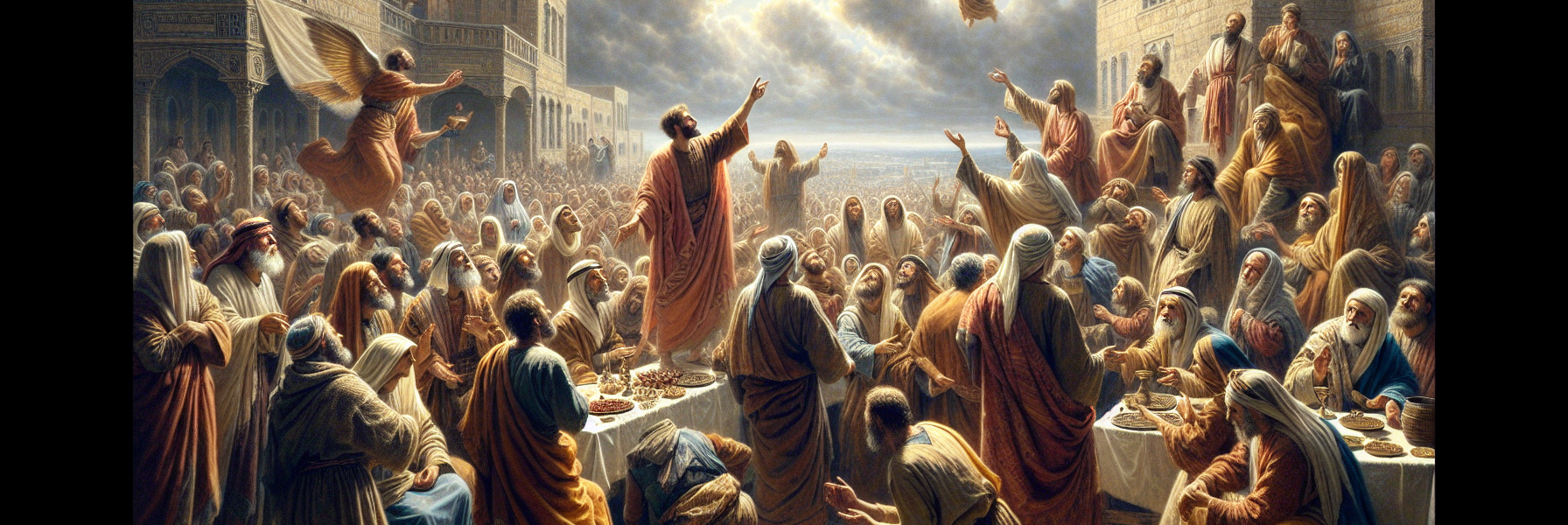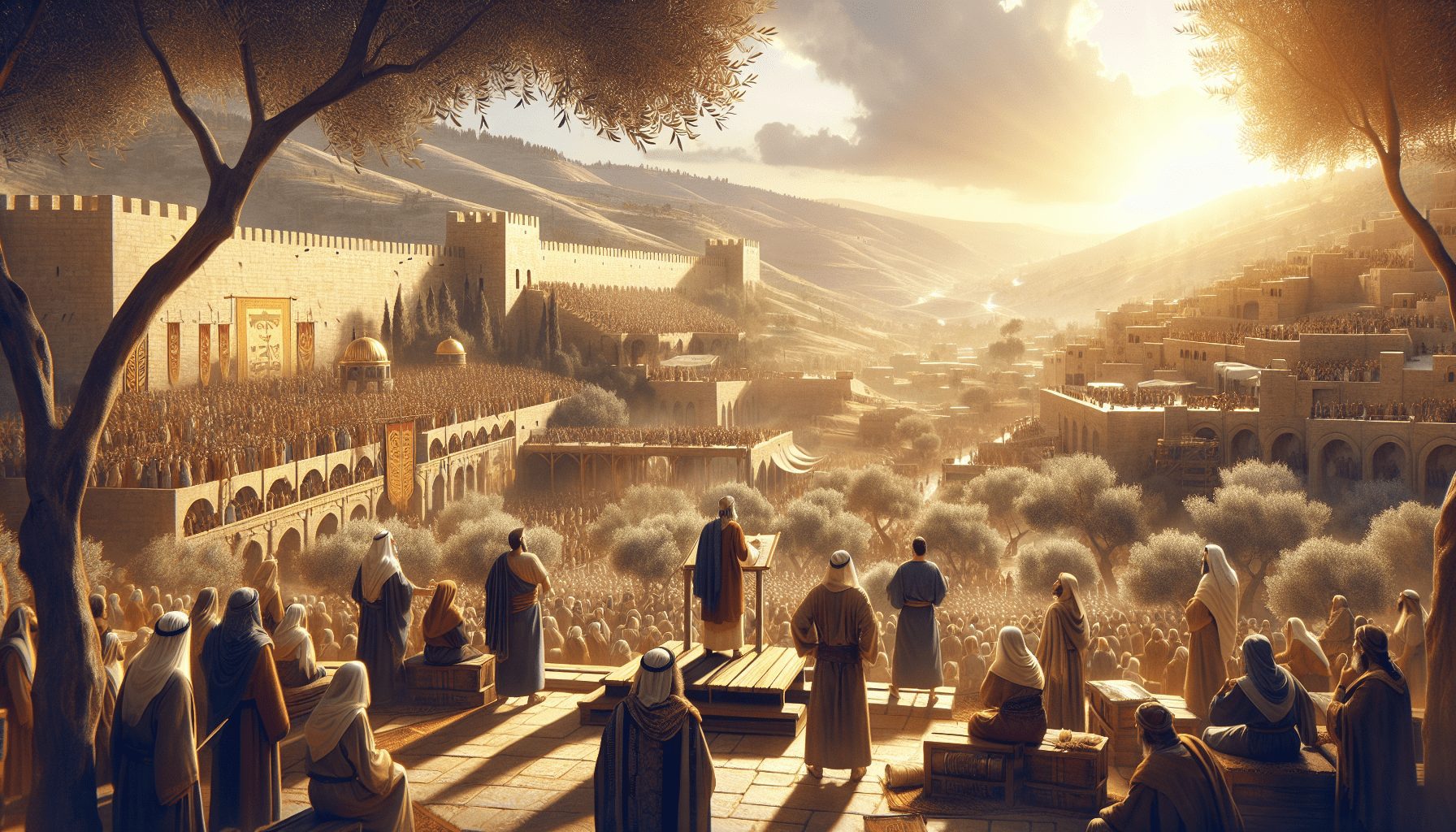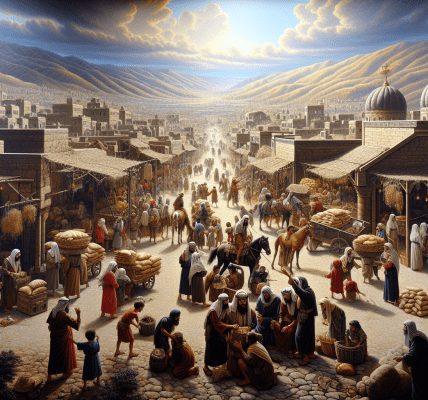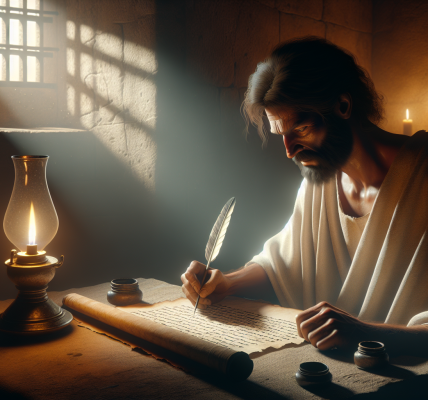**The Shadow of Deceit and the Light of Truth**
The early days of the church in Jerusalem were filled with a holy fervor. The believers, bound together by their faith in the risen Christ, shared everything they had. No one claimed any possession as their own, but all things were held in common. The apostles, empowered by the Holy Spirit, performed many signs and wonders among the people, and great grace was upon them all.
Among the believers was a man named Joseph, a Levite from Cyprus, whom the apostles called Barnabas—meaning “Son of Encouragement.” He sold a field he owned and brought the money, laying it at the apostles’ feet as a gift for the community. His generosity was sincere, a fragrant offering to God.
But not all hearts were pure.
A man named Ananias, with his wife Sapphira, also sold a piece of property. Yet, unlike Barnabas, they conspired together in secret. “Let us keep back part of the proceeds,” Ananias whispered to his wife, his fingers tightening around the coins. “No one will know. We will bring the rest and still be praised for our generosity.” Sapphira nodded, her eyes gleaming with the same deceit.
The next day, Ananias strode into the assembly where the apostles gathered. The air was thick with the scent of burning oil lamps and the murmur of prayers. With a practiced smile, he placed the money before Peter’s feet.
But Peter, filled with the Holy Spirit, fixed his gaze upon him. “Ananias,” he said, his voice low but piercing, “why has Satan filled your heart to lie to the Holy Spirit and keep back part of the proceeds of the land? While it remained unsold, was it not your own? And after it was sold, was it not under your control? Why have you conceived this deed in your heart? You have not lied to men but to God.”
Ananias’ breath caught in his throat. His hands trembled. The room seemed to sway around him as the weight of his sin pressed upon him like a millstone. Before he could utter a word, his legs gave way. He collapsed to the ground, lifeless. A gasp rippled through the room.
Young men among the believers rose immediately, wrapped his body in linen, carried him out, and buried him.
Three hours later, Sapphira entered, unaware of what had happened. Peter turned to her, his eyes filled with sorrow. “Tell me,” he said, “did you sell the land for so much?”
She lifted her chin slightly. “Yes, for so much.”
Peter exhaled slowly. “How is it that you have agreed together to test the Spirit of the Lord? Behold, the feet of those who have buried your husband are at the door, and they will carry you out as well.”
At once, she crumpled to the floor, her breath fleeing her body. The young men returned and found her dead. They carried her out and buried her beside her husband.
Terror seized the whole church and all who heard of these things. The fear of the Lord was heavy upon them, for they understood that God would not be mocked.
Yet, the apostles continued to perform many signs and wonders among the people. The believers met daily in Solomon’s Portico, their hearts knit together in unity. No one else dared join them, though the people held them in high esteem. And more than ever, multitudes of both men and women were added to their number, for the power of God was at work among them.
The sick were brought into the streets on beds and mats, that even Peter’s shadow might fall on them as he passed by. From the surrounding cities, crowds gathered, bringing those tormented by unclean spirits, and all were healed.
But the high priest and the Sadducees, filled with jealousy, rose up against them. They arrested the apostles and threw them into the public prison.
Yet that very night, an angel of the Lord opened the prison doors. “Go,” he commanded, “stand in the temple and speak to the people all the words of this Life.”
At daybreak, the apostles obeyed, teaching boldly in the temple. When the council assembled, they sent officers to retrieve the prisoners—only to find the prison securely locked, the guards stationed, but no one inside.
Perplexed, the high priest demanded an explanation. Then a messenger arrived, breathless. “The men you put in prison are standing in the temple, teaching the people!”
The captain of the temple guard hurried to bring them in—not with violence, for they feared the people—and set them before the council. The high priest’s voice was sharp. “We strictly charged you not to teach in this name, yet here you have filled Jerusalem with your teaching, and you intend to bring this man’s blood upon us!”
But Peter and the apostles answered without hesitation, “We must obey God rather than men. The God of our fathers raised Jesus, whom you killed by hanging Him on a tree. God exalted Him at His right hand as Leader and Savior, to give repentance to Israel and forgiveness of sins. And we are witnesses to these things, and so is the Holy Spirit, whom God has given to those who obey Him.”
The council seethed with rage. They wanted to kill them. But a Pharisee named Gamaliel, a teacher of the law held in honor by all the people, stood and cautioned them. “Men of Israel, take care what you are about to do with these men. If this plan is of man, it will fail. But if it is of God, you will not be able to overthrow them—lest you even be found opposing God.”
His words swayed them. They beat the apostles, charged them once more not to speak in the name of Jesus, and let them go.
The apostles departed, rejoicing that they were counted worthy to suffer dishonor for the Name. And every day, in the temple and from house to house, they did not cease teaching and preaching Jesus as the Christ.
Thus, the word of God spread, unhindered, and the church grew mightily in the power of the Spirit.




